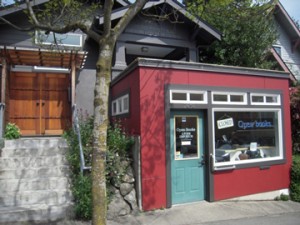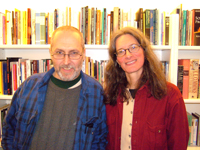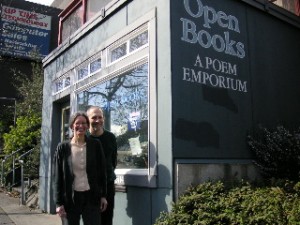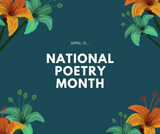September 27, 2010
 Open Books: A Poem Emporium is one of two poetry-only bookstores in the US. Married co-owners John Marshall and Christine Deavel live in the bungalow above the store. Maybe this goes without saying, but they are both poets (read her work here and here, his work, as J.W. Marshall, here and here). We asked them a few questions. Christine answered (and John vetted them). Don’t miss Christine’s recommendations at the end of the interview. Even if you’re not a poetry reader, you have to admire how evocative and well-written the reviews are. Talk about living your work (and the dream).
Open Books: A Poem Emporium is one of two poetry-only bookstores in the US. Married co-owners John Marshall and Christine Deavel live in the bungalow above the store. Maybe this goes without saying, but they are both poets (read her work here and here, his work, as J.W. Marshall, here and here). We asked them a few questions. Christine answered (and John vetted them). Don’t miss Christine’s recommendations at the end of the interview. Even if you’re not a poetry reader, you have to admire how evocative and well-written the reviews are. Talk about living your work (and the dream).Year established? Open Books: A Poem Emporium came into existence in 1995, a transmogrification of Open Books, which was a general bookstore with a large poetry section that we started in 1987 in a rented space seven blocks from where we are now.
Square feet? 480 of retail space; 500 of office and storage.
 Number of Employees? None other than the two of us. Sometimes I’m the boss; sometimes John is. We’ve both quit some mornings and been rehired in the afternoon. Same with being fired.
Number of Employees? None other than the two of us. Sometimes I’m the boss; sometimes John is. We’ve both quit some mornings and been rehired in the afternoon. Same with being fired.Neighborhood? We are on the main drag of Seattle’s Wallingford neighborhood, about a mile west of the University of Washington and about four miles north of downtown.
Store cat? Nope (too many allergic customers). However, we are very friendly to our resident spiders (sometimes to customers’ dismay), and we welcome visiting dogs (treats available at the till).
Creaky floors quotient (or some facts about your space)? We converted the basement of a student-rental bungalow into the store. The till is where the driveway was. Though it has no windows other than at the front, it’s bright and inviting. And long and narrow. The poet Dorianne Laux said giving a reading at our store was like giving a reading on a train.
What led you to opening an all-poetry bookstore? Need and desire. In 1994 the horizon looked dark for a small general bookstore, with Barnes and Noble and Borders expanding at a breakneck pace. And we were longing to focus on what we knew and loved – poetry. If we were to remain in the book business (and we wanted to), we decided we would play to our strength.
Does owning a bookstore zap your energy for writing or invigorate you? It’s retail, and a retail business we own, so yes, it takes its toll as any job would. But it is absolutely wonderful to be around people who love poetry when you love poetry and try to write it. We have learned so much from our customers and from the books that have come to our shelves – more than our MFAs gave us.
 What’s it like living above your store? It’s been great. One of us can trundle downstairs to snare a book at midnight, if we want. There are no interior connections between the spaces, so we have to go outside to make the transition from private to public space, a psychological and physical barrier that’s crucial. And we have a locking gate (with no door bell) that leads to the apartment. We can hear the store’s answering machine pick-up from our little dining area, but we don’t feel compelled to run down to check it. We’re just glad to know it works.
What’s it like living above your store? It’s been great. One of us can trundle downstairs to snare a book at midnight, if we want. There are no interior connections between the spaces, so we have to go outside to make the transition from private to public space, a psychological and physical barrier that’s crucial. And we have a locking gate (with no door bell) that leads to the apartment. We can hear the store’s answering machine pick-up from our little dining area, but we don’t feel compelled to run down to check it. We’re just glad to know it works.Who are your regulars? A true mix – young and old and in-between; students and retirees; doctors, engineers, professors, lawyers, restaurant workers. Many (probably most) are writers, but some just enjoy reading poetry.
What are some of the other businesses you frequent in your neighborhood? We are lucky to be so near a two-screen movie theater (the charming Guild 45th), a number of tasty restaurants (Jhanjay, which serves vegetarian Thai food is stellar; Musashi’s, a long-time Wallingford sushi restaurant that is modest and much loved; Kabul, a tasty Afghan place just up the street); a great selection of bars, two ice-cream shops (we’re particularly fond of Fainting Goat). And we’ve got the Good Shepherd Center just a block and a half away – a former home for wayward girls that now has events in its beautiful chapel space; we’ll be hosting our first “Open Elsewhere” reading there in November, a reading by Tacoma poet Gjertrud Schnackenberg from her new book, Heavenly Questions (due from FSG in October).
What’s the best lunch within walking distance? Musashi’s and Jhanjay, mentioned above. Also, Kisaku (Japanese) and Chile Pepper (Mexican). And we like the veggie dog options at Diggity Dog (get it to go and sit at Green Lake for a spell – that’s for a day off, of course).
What’s your all-time bestseller? We’re not computerized, so we can’t say for sure, but I’m guessing Anne Carson’s Glass, Irony, and God would be near the top of the list.
Name a book blog or website you frequent? Well, we don’t really frequent book blogs or websites, other than publishers’ or wholesalers’ sites, the ABA, or abebooks.com to price used books. Small Press Distribution’s site is quite helpful for keeping up on lesser known titles.
A CD you’d love to handsell? There aren’t that many to offer anymore. Publishers seem to be letting that side of the business go in poetry. We do stock some of the Academy of American Poets CDs, and those are a pleasure to present (the John Berryman/Robert Lowell reading is an astounding piece of history). So many poetry recordings are no longer available – it’s sad. We treasure our tapes of Allen Grossman and Tomas Transtromer from the now defunct Watershed Tapes.

A children’s book you love to give as a gift? X.J. Kennedy’s Talking Like the Rain.
Will you recommend a few books?
 Joanie Mackowski’s much anticipated second collection is View from a Temporary Window ($14.95 Univ. of Pittsburgh). And what a view it is — the ordinary made extraordinary through her distinctive imagination, attention, and lyricism. As that title suggests, the poems rise from a mind attuned to the power of shifting perspective, to the unsettling, enchanting inevitability of change — celestial and cellular. The language of natural science joins with the otherworldly situations of fairytale or dream or deep contemplation to create a poetry of and about transformation, and does so in an elegant quietness of tone and remarkably graceful musicality. With warmth, and the occasional note of melancholy, these vivid, memorable poems sing of and out of the mixed blessing of consciousness, as in these opening lines from the book’s opening poem, “Prayer” — “That the hole in my skull never quite grows over / with mosses or brick. That no lover / on a ladder can patch it, no permissive meadow / can fold its field over. For there’s too much to know. / There’s too much to want never to contain.”
Joanie Mackowski’s much anticipated second collection is View from a Temporary Window ($14.95 Univ. of Pittsburgh). And what a view it is — the ordinary made extraordinary through her distinctive imagination, attention, and lyricism. As that title suggests, the poems rise from a mind attuned to the power of shifting perspective, to the unsettling, enchanting inevitability of change — celestial and cellular. The language of natural science joins with the otherworldly situations of fairytale or dream or deep contemplation to create a poetry of and about transformation, and does so in an elegant quietness of tone and remarkably graceful musicality. With warmth, and the occasional note of melancholy, these vivid, memorable poems sing of and out of the mixed blessing of consciousness, as in these opening lines from the book’s opening poem, “Prayer” — “That the hole in my skull never quite grows over / with mosses or brick. That no lover / on a ladder can patch it, no permissive meadow / can fold its field over. For there’s too much to know. / There’s too much to want never to contain.” Bill Holm was a larger-than-life presence, a big man with a big heart who wrote poems and essays that were embracing, tender, prickly, exuberant, comic, irritated, wry, and filled with gratitude for life in all its beauty and absurdity. Though 2009 brought the difficult news of his death, it also brought a rich and pleasing volume of his work — The Chain Letter of the Soul: New and Selected Poems ($18 Milkweed). Nearly one hundred new poems appear for the first time here, along with ample selections from his earlier collections. His writing is vivid with descriptions of the people and settings of his native Minnesota and his parents’ home country of Iceland, where he returned many times. It is the work of one who was appreciative of the iconoclast, suspicious of organized religion, and troubled by the politics of recent years. His reverence for music, particularly for the classical piano repertoire he so delighted in playing, echoes throughout. Bill Holm knew sadness and pleasure with depth. He savored, mourned, questioned, and rejoiced — and lucky for us wrote so much down.
Bill Holm was a larger-than-life presence, a big man with a big heart who wrote poems and essays that were embracing, tender, prickly, exuberant, comic, irritated, wry, and filled with gratitude for life in all its beauty and absurdity. Though 2009 brought the difficult news of his death, it also brought a rich and pleasing volume of his work — The Chain Letter of the Soul: New and Selected Poems ($18 Milkweed). Nearly one hundred new poems appear for the first time here, along with ample selections from his earlier collections. His writing is vivid with descriptions of the people and settings of his native Minnesota and his parents’ home country of Iceland, where he returned many times. It is the work of one who was appreciative of the iconoclast, suspicious of organized religion, and troubled by the politics of recent years. His reverence for music, particularly for the classical piano repertoire he so delighted in playing, echoes throughout. Bill Holm knew sadness and pleasure with depth. He savored, mourned, questioned, and rejoiced — and lucky for us wrote so much down. Angina Days: Selected Poems by Günter Eich (Princeton $24.95) is a bracing and needed collection of work by the post-WW II German poet (1907-1972), who though well-known in his home country has been little recognized here. Presented in a bilingual edition with English versions by the well-respected translator Michael Hofmann, this selection of 80 poems includes many translated for the first time, most from Eich’s later writing. The volume begins with a helpful and compelling introduction by Hofmann, who places Eich at the forefront of those German writers who sought to reclaim their native tongue after its debasement by the Third Reich. His plain-spoken poems are typically brief and powerfully evocative. Writes Hofmann, “Where for Rilke… the poet’s imperative had been to praise, for Eich it was to unsettle, disturb, provoke, rile.” Yet the poems are a pleasure to read, not only for their crispness, but also for their humble often wry tone. Here is his poem “Understanding” – “Everyone knows / there is no such place as Mexico. // When I opened the kitchen cupboard / I found the truth / obscured / by labels on tins. // The rice grains / are resting after the centuries. / Outside / the wind goes on on its way.”
Angina Days: Selected Poems by Günter Eich (Princeton $24.95) is a bracing and needed collection of work by the post-WW II German poet (1907-1972), who though well-known in his home country has been little recognized here. Presented in a bilingual edition with English versions by the well-respected translator Michael Hofmann, this selection of 80 poems includes many translated for the first time, most from Eich’s later writing. The volume begins with a helpful and compelling introduction by Hofmann, who places Eich at the forefront of those German writers who sought to reclaim their native tongue after its debasement by the Third Reich. His plain-spoken poems are typically brief and powerfully evocative. Writes Hofmann, “Where for Rilke… the poet’s imperative had been to praise, for Eich it was to unsettle, disturb, provoke, rile.” Yet the poems are a pleasure to read, not only for their crispness, but also for their humble often wry tone. Here is his poem “Understanding” – “Everyone knows / there is no such place as Mexico. // When I opened the kitchen cupboard / I found the truth / obscured / by labels on tins. // The rice grains / are resting after the centuries. / Outside / the wind goes on on its way.” Now well into her 80s, Shirley Kaufman is writing poetry of remarkable power. Ezekiel’s Wheels ($14 Copper Canyon), her ninth collection, brims with forthright, thoughtful, and moving poems. Rarely has a book so focused on frailty been so vigorous, one so revealing about increasing confusion been so gracefully articulate, work so honest in its acknowledgment of death exhibited such vitality. Born in Seattle, she has been a resident of Jerusalem for over 30 years, and while that region and its complications surface in her work, it is the territory of long life from which she frequently, and candidly, reports — “When you’ve been given / a second chance / you need / to care more (less) / about what you live for // not so much staying alive // as the old skin you wear / the everyday sloughing.” Her work is sparse on personal detail yet bracingly intimate — to read these poems is nearly to feel her breath as she speaks. Though emotion underpins the poetry, it is decidedly unsentimental, touched with a loving starkness — “Old maps have been folded // so long they split at the crease. / If everyone’s lost on the roads, / you might as well fly. You might even / enjoy what’s left of your life // in a state of amazement. I meant / to say ‘acceptance.’ But it came out / like this. My slips are the best / part. The part that’s true.”
Now well into her 80s, Shirley Kaufman is writing poetry of remarkable power. Ezekiel’s Wheels ($14 Copper Canyon), her ninth collection, brims with forthright, thoughtful, and moving poems. Rarely has a book so focused on frailty been so vigorous, one so revealing about increasing confusion been so gracefully articulate, work so honest in its acknowledgment of death exhibited such vitality. Born in Seattle, she has been a resident of Jerusalem for over 30 years, and while that region and its complications surface in her work, it is the territory of long life from which she frequently, and candidly, reports — “When you’ve been given / a second chance / you need / to care more (less) / about what you live for // not so much staying alive // as the old skin you wear / the everyday sloughing.” Her work is sparse on personal detail yet bracingly intimate — to read these poems is nearly to feel her breath as she speaks. Though emotion underpins the poetry, it is decidedly unsentimental, touched with a loving starkness — “Old maps have been folded // so long they split at the crease. / If everyone’s lost on the roads, / you might as well fly. You might even / enjoy what’s left of your life // in a state of amazement. I meant / to say ‘acceptance.’ But it came out / like this. My slips are the best / part. The part that’s true.” The tenth volume in the Pacific Northwest Poetry Series, edited by Linda Bierds and published by the University of Washington Press, Christopher Howell’s Dreamless and Possible: New and Selected Poems ($24.95) is a rich and welcome gathering from over three decades of fine work. Howell is a poet capable of remarkable articulation, and what he articulates is humanness, hurt and comfort, joy and, most movingly, grief. He writes as a parent who has lost a child, a sailor who came back from war, a man with a searching mind and an open heart — “Some of those I love have left the world. // If the sun continues and the blue sky burns / and the sea reaches into itself almost lazily / for food and the arithmetic of what looks like / grace (until it kills you), what use my grieving / hope? Something blue-black soughs in me / like a storm of ancient invitation and regard.” His language is clear and quietly stunning whether his imagery is dream-like and surreal or startlingly familiar, such as climbing roses “spreading their elegant wrists across the field,” or dogs playing “with the vacancy / of the vacant lot across the street.” His poetry is art’s translation of what “bewilders and blesses us.”
The tenth volume in the Pacific Northwest Poetry Series, edited by Linda Bierds and published by the University of Washington Press, Christopher Howell’s Dreamless and Possible: New and Selected Poems ($24.95) is a rich and welcome gathering from over three decades of fine work. Howell is a poet capable of remarkable articulation, and what he articulates is humanness, hurt and comfort, joy and, most movingly, grief. He writes as a parent who has lost a child, a sailor who came back from war, a man with a searching mind and an open heart — “Some of those I love have left the world. // If the sun continues and the blue sky burns / and the sea reaches into itself almost lazily / for food and the arithmetic of what looks like / grace (until it kills you), what use my grieving / hope? Something blue-black soughs in me / like a storm of ancient invitation and regard.” His language is clear and quietly stunning whether his imagery is dream-like and surreal or startlingly familiar, such as climbing roses “spreading their elegant wrists across the field,” or dogs playing “with the vacancy / of the vacant lot across the street.” His poetry is art’s translation of what “bewilders and blesses us.”


[…] This post was mentioned on Twitter by Harriett Logan, Rhonda Hughes. Rhonda Hughes said: Ever been to Open Books in Seattle? It's one of two poetry-only bookstores in the US… http://fb.me/CYuaAChH […]